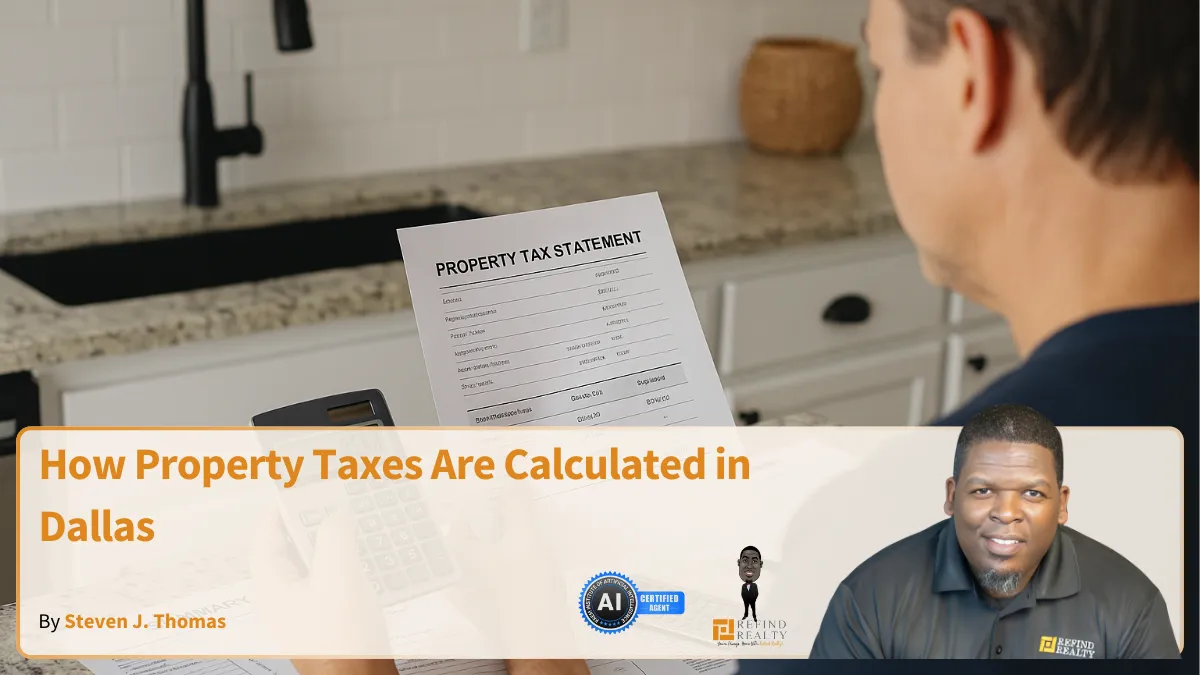
How Property Taxes Are Calculated in Dallas
How Property Taxes Are Calculated in Dallas
By Steven Thomas, Refind Realty

If you’re buying or selling in Dallas, understanding property taxes isn’t optional—it’s essential. These taxes directly affect your monthly mortgage, your closing costs, and even your long-term equity strategy.
Every week, I walk my clients through how taxes work, how they’re calculated, and what you can actually do to manage them. Here’s everything you need to know—broken down without the fluff.
What Determines Your Property Tax in Dallas?
In Texas, property taxes are based on two main things:
Your home’s assessed value
Your total local tax rate
The basic formula looks like this:
Assessed Value × Local Tax Rate = Annual Property Tax
Let’s break that down further.
1. How Your Home’s Value Is Calculated
Each year, your county’s appraisal district estimates the value of your property based on market data. That’s called your appraised value. If you live in your home, you can file for a homestead exemption, which lowers the taxable amount.
For example:
Appraised Value: $500,000
Homestead Exemption: $40,000
Taxable Value (Assessed): $460,000
Make sure you’re taking advantage of all the exemptions available. If you haven’t filed yet, start here:
👉 Home Selling Options
2. What Local Tax Rates Include
Your total property tax rate is made up of different taxing entities, depending on where you live. In Dallas County, these usually include:
The school district
The city of Dallas
Dallas County
Local college, hospital, or MUD districts
Rates vary, but the average in Dallas hovers between 2% and 2.8% of your assessed value.
To check your exact rate or search your property record, go to the Dallas Central Appraisal District.
3. How Often Your Taxes Can Go Up
Property values are reviewed every year by the appraisal district. So yes—your tax bill can go up yearly, even if you’ve made no changes to your home.
But if your home is your primary residence, your assessed value can only increase by a maximum of 10% each year, thanks to Texas homestead protections.
Want to be sure you’re protected? Apply for your exemption and read more here:
👉 New Construction Home Guide
4. Can You Appeal Your Property Taxes?
Yes—and sometimes you should. If you think your home’s appraised value is too high, you can file a protest with the appraisal district.
I help my clients gather the necessary comps, condition reports, and supporting documents. Some have saved thousands by appealing.
If you're selling soon and need comps or market data to support a protest, let’s talk.
👉 Get Pre-Approved (Yes, buyers can protest future taxes too.)
5. How Property Taxes Impact Buyers and Sellers
When you sell, taxes are prorated at closing. That means you only pay for the portion of the year you owned the property.
If you’re buying, your lender will likely escrow 12 months of estimated taxes upfront. Be aware:
New construction homes may not have exemptions filed yet
Appraisals can lag behind fast-changing markets
If you’re buying new in Frisco, Celina, McKinney or elsewhere, read this first:
👉 Dallas-Fort Worth New Construction Homes
Lowering Your Tax Bill: What You Can Actually Do
Here are three ways to potentially reduce your property taxes:
File a Homestead Exemption (primary residence)
Apply for Over-65 or Disabled Person Exemptions
File an Appeal with Supporting Market Data
If you're not sure which of these apply to you, or how to complete the paperwork, I’ll walk you through it. You can also learn more about what to expect in the selling process here:
👉 Home Seller Checklist
The Bottom Line
Whether you’re planning to move or just want to better understand your home’s carrying costs, knowing how property taxes are calculated puts you in control.
If you’re looking to buy, sell, or appeal your current tax bill, let’s talk.
Download the Lone Star App here: https://lonestarliving.hsidx.com/@sthomas
You're Always Home With Refind Realty.
FAQs
What is the average property tax rate in Dallas County?
Most homes fall between 2% and 2.8%, depending on the taxing districts.
Can I appeal my property tax value?
Yes. You can protest the value through your county’s appraisal district, typically in spring.
Do I pay property taxes at closing when I buy?
Yes. They're prorated based on your purchase date.
What exemptions lower property taxes in Texas?
Homestead, over-65, disabled person, and disabled veteran exemptions.
Do new construction homes have higher taxes?
Usually, yes—especially in developing suburbs. Always verify with the appraisal district.